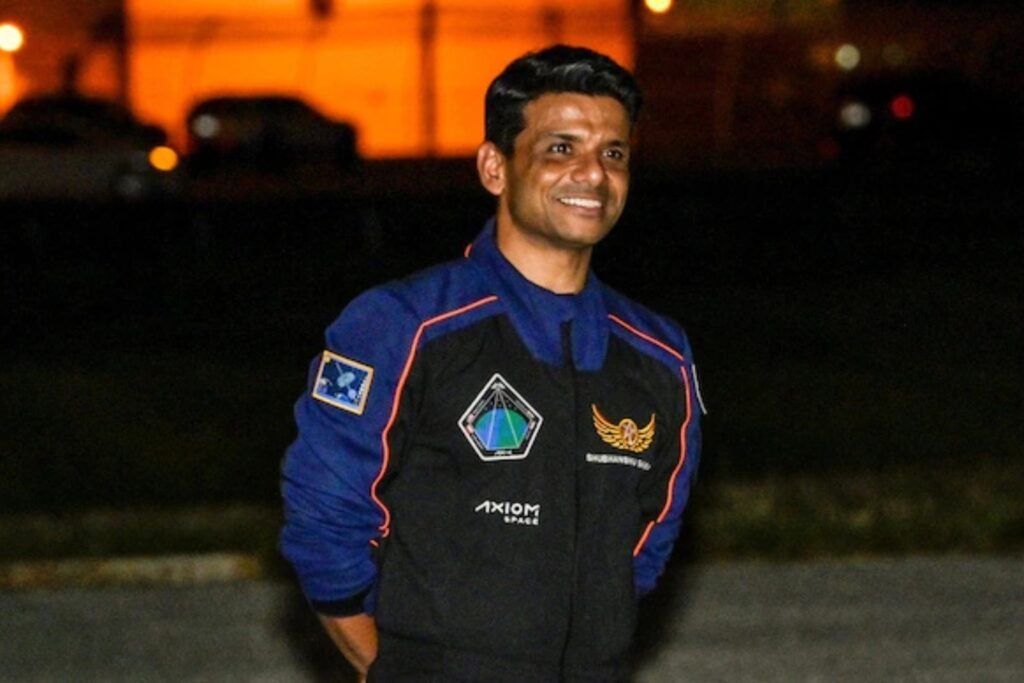A Historic Homecoming: India’s Shubhanshu Shukla Returns Safely from Space

Group Captain Shubhanshu Shukla, a 39-year-old test pilot and Indian Air Force officer, landed on Earth safely after completing an 18-day successful mission on the International Space Station (ISS) as part of the crew of Axiom Mission 4 (Ax-4). On June 25, launched from NASA’s Kennedy Space Center, the mission was a historic milestone for India’s space program, with Shubhanshu Shukla becoming the first Indian on private spaceflight to the ISS.
His return was met with national jubilation, and congratulatory messages flooded in from political leaders, scientists, and citizens.
Leaders Praise the Milestone
Uttar Pradesh Chief Minister Yogi Adityanath declared Shubhanshu Shukla’s return as a “proud symbol of courage, dedication, and commitment to science.” Emphasizing the influence on the youth of Uttar Pradesh, he welcomed the team home with warm commendation on social media.
Prime Minister Narendra Modi observed the importance of the mission to India’s overall space ambitions, describing it as a “milestone towards our own Human Space Flight Mission, Gaganyaan.” He commended Shubhanshu Shukla’s pioneering zeal and commitment to science, describing it as an inspiration to a billion aspirations.
Union Minister Rajnath Singh shared similar feelings, saying Shubhanshu Shukla had “taken India’s aspirations to new heights” with his successful journey.
A Homecoming Ultimate of Joy and Relief
In Lucknow, there was a sense of excitement. Shubhanshu Shukla’s family, comprising Shambhu Dayal and Asha Shukla, was overjoyed and relieved at his safe return. His mother was spotted reciting the Sunderkand as the capsule was heading towards splashdown, while later the family also cut cake and offered prayers. “My son has returned safely, I thank God,” was the emotional response of Asha Shukla.
Dragon capsule “Grace” transporting Shubhanshu Shukla and the crew splashed down off San Diego after a 22.5-hour flight from the ISS. The reentry of the mission consisted of precision flights with repeated burns, parachute deployment, and cargo transfers prior to recovery.
Science and Symbolism
While they were on the ISS, Shubhanshu Shukla and the Ax-4 astronauts performed over 60 scientific experiments. These involved research on tardigrades, crop seeds, algae, and muscle cell growth, experiments likely to prove globally relevant. Union Minister Jitendra Singh highlighted the scientific and symbolic significance of the mission, as a “moment of glory” for India and a step towards the country’s future in space leadership.
ISRO also said that all experiments scheduled were executed to perfection. The agency celebrated the contribution of the research towards space science and agriculture.
Legacy in the Making
BJP President J.P. Nadda announced Shubhanshu Shukla’s mission as a golden page in India’s space history. For the youth, it wasn’t about one astronaut traveling to space, it was about making dreams come true and a nation challenging the stars.
With the success of Axiom Mission 4, India not only demonstrated its spaceflight ability but also made a huge step towards Gaganyaan, its first human flight mission. As everyone celebrates, one thing is certain: Shubhanshu Shukla’s experience has set the country’s imagination ablaze.
Who is Shubhanshu Shukla astronaut?
Shubhanshu Shukla astronaut biography is one of discipline, courage, and relentless pursuit of excellence. From a top test pilot to an Indian space hero, he has broken new ground as the first Indian on private spaceflight to the ISS.
Shubhanshu Shukla International Space Station journey
The Shubhanshu Shukla space mission, especially his work on microgravity experiments during the Axiom-4 flight, has positioned him as a central figure in India’s role in private space missions. His safe return marks a critical step for an Indian test pilot returning from space and for India’s broader ambitions in the cosmos.
India astronaut returns from ISS
With Shubhanshu Shukla Axiom-4 making global headlines, this Indian astronaut ISS mission shows that India’s space narrative is no longer confined to government-backed efforts alone. It’s evolving, and Shubhanshu Shukla’s name will remain etched in that story.
